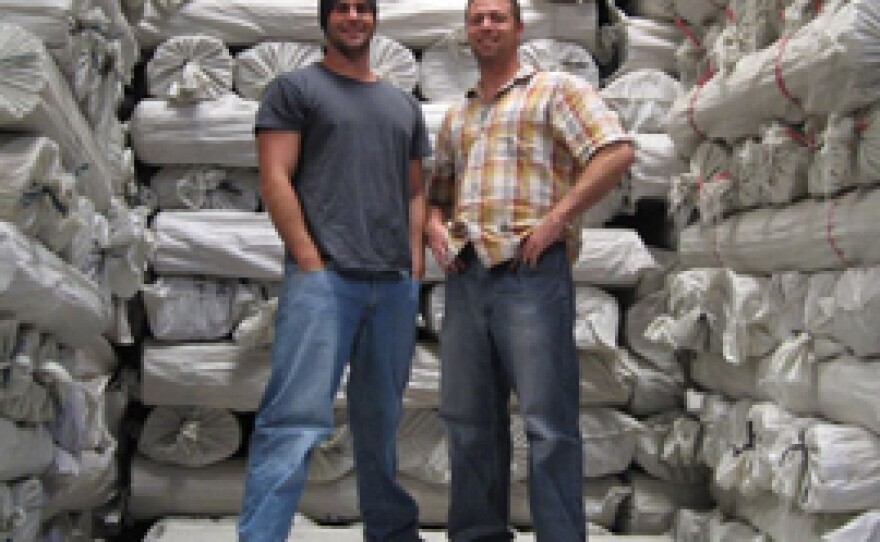What do you get when you combine two surfers, a forest of bamboo, and a broken foot? In the case of two young San Diego men – they've got, the genesis of a successful and environmentally friendly business. Joanne Faryon has their story in our occasional series on ordinary people doing extraordinary things.
An 8,000 square foot warehouse is brimming with a few hundred twenty-somethings. There are kegs of beer and a bright red liquid is being served out of the water cooler.
My husband and I are easily among the oldest people at this party.
No, we didn’t sneak into a frat house. It’s the former home of Cali Bamboo. We were Cali Bamboo’s first customers two years ago, when owners Jeff Goldberg and Tanner Haigwood had a good idea and very little money. Now the two are celebrating the success and expansion of their bamboo fence company.
Goldberg: We’re just having this party because we’re celebrating life and we’re at a really good point in life and everyone’s really just excited about where we’re headed, and where we’ve come from and we also happen to have an 8000 square foot facility that’s empty so why not use it.
Their old warehouse is empty because they’re moving into a new facility twice the size. They need the space to keep up with demand for the bamboo they sell. 250,000 pounds of bamboo every month.
Goldberg and Haigwood estimate their company’s worth at more than $10 million.
So just how did two unemployed surfers end up with a multi-million-dollar company in two years?
A few days after the party, Goldberg and Haigwood sit in their boardroom. The boardroom is just that, a room surrounded by more surfboards than office chairs.
They describe the business as a lifestyle company, one in which all of their 15 employees are under 30 and most are surfers. It’s okay to be late for work here, if the surf is up. There’s even a custom built shower for late-comers.
Goldberg, 30, and Haigwood, 29, were on a surf trip in Hawaii. They were doing odd jobs when Goldberg got the idea that would change both their lives.
Goldberg: After a week by myself in this forest cutting down bamboo, I guess I had nothing else to think about but bamboo and the idea popped into my head one day.
Goldberg believed it wouldn’t be hard to turn bamboo stalks into fencing. A broken foot, sent him home to San Diego. He began researching his business idea.
Goldberg: I owned a house. I had equity in it, I took out a $50,000 line of credit on my home and hoped for the best.
They spent the entire $50,000 in the first six months.
Haigwood: Times were rough, I think I actually lived in the warehouse for three months, so it wasn’t exactly an easy start-up.
Cali Bamboo imports its bamboo poles and fences from Asia and then ships them to homeowners and businesses in the U.S., Canada and Mexico.
Bamboo is the fastest growing woody plant in the world, some species can grow up to four feet a day. It sequesters more unwanted carbon dioxide and releases more oxygen than just about any species of tree. That has many environmentalists heralding the virtues of bamboo.
In North America, bamboo is traditionally used for flooring, fences, tiki bars, anything that requires a tropical look. But local manufacturers are now discovering what Asian countries have known for centuries. Bamboo can be used to make just about anything, including paper, clothing, and furniture.
Re-enter - Cali Bamboo and Goldberg and Haigwood’s next big adventure.
Haigwood: Ideally we would like to grow in a renewable resource superstore. Anything that can be replaced with bamboo or any other renewable product that makes sense we would like to see it happen.
Goldberg and Haigwood plan to expand their product line in the next few months and eventually franchise.
They know it won’t be easy. The popularity of bamboo is growing and so is the number of bamboo retailers.
The entrepreneurs also know, if a retail giant like Home Depot enters the bamboo market, it could put them out of business. But Goldberg says selling bamboo isn’t just about the money. Like any surfer knows, its all about the ride. For KPBS, I’m Joanne Faryon.
Goldberg: Whether or not we are around in ten years or not, and this idea takes off and other people run with it and this movement spreads and becomes a mainstream product that literally takes away huge market shares from other products that are not renewable, then we’ll both sit back and smile and look at each other and know we did something really good …for the planet.






